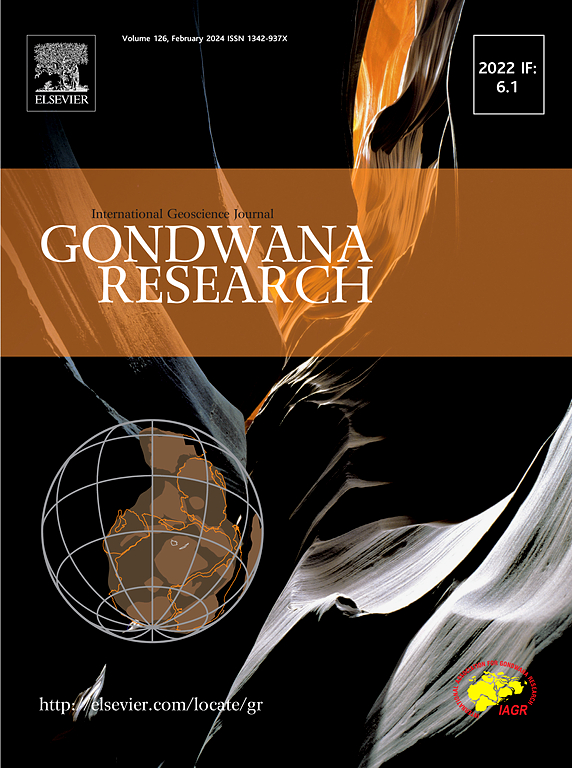Charting green growth and environmental sustainability in emerging economies: Do sectoral energy intensity, green finance, and green technology innovation matter?
IF 7.2
1区 地球科学
Q1 GEOSCIENCES, MULTIDISCIPLINARY
引用次数: 0
Abstract
Emerging economies face the dual challenges of enhancing green growth while limiting carbon emissions. Therefore, the study investigates the impact of sectoral energy intensity, renewable energy, green technological innovations, and green finance on green growth and carbon footprint in selected 13 emerging economies from 2000 to 2022. This study employed Driscoll- Kraay and Three-stage least squares (3SLS) estimators for robustness. The robust findings demonstrate that agricultural and service sector energy intensity positively affects green growth, while industrial energy intensity has a negative impact. On the contrary, agriculture, industry, and service energy intensity, green finance, and green growth increase the carbon footprint, while green technology helps decrease it. Furthermore, the threshold analysis outlined that the energy intensity in the service sector effectively limits carbon footprint and enhances green growth in the presence of renewable energy as a threshold variable; while considering the interactions of renewable energy with green finance, the industrial energy intensity outperforms with compared energy intensity of other sectors. The results suggest that government and policymakers should formulate several policies that channel green finance for advancing technological innovation and boosting renewable energy projects through enhancing green growth while limiting carbon footprint to accomplish the sustainable development goals set by emerging economies.

描绘新兴经济体的绿色增长和环境可持续性:行业能源强度、绿色金融和绿色技术创新重要吗?
新兴经济体面临促进绿色增长和限制碳排放的双重挑战。因此,本研究选取了13个新兴经济体,调查了2000年至2022年间行业能源强度、可再生能源、绿色技术创新和绿色金融对绿色增长和碳足迹的影响。本研究采用Driscoll- Kraay和三阶段最小二乘(3SLS)估计器进行鲁棒性估计。研究结果表明,农业和服务业能源强度对绿色增长具有正向影响,而工业能源强度对绿色增长具有负向影响。相反,农业、工业、服务业的能源强度、绿色金融和绿色增长增加了碳足迹,而绿色技术有助于减少碳足迹。此外,阈值分析表明,在可再生能源作为阈值变量存在的情况下,服务业的能源强度有效地限制了碳足迹,并促进了绿色增长;考虑到可再生能源与绿色金融的相互作用,工业能源强度优于其他行业的能源强度。研究结果表明,政府和决策者应制定若干政策,引导绿色金融通过促进绿色增长和限制碳足迹来推动技术创新和可再生能源项目,以实现新兴经济体设定的可持续发展目标。
本文章由计算机程序翻译,如有差异,请以英文原文为准。
求助全文
约1分钟内获得全文
求助全文
来源期刊

Gondwana Research
地学-地球科学综合
CiteScore
12.90
自引率
6.60%
发文量
298
审稿时长
65 days
期刊介绍:
Gondwana Research (GR) is an International Journal aimed to promote high quality research publications on all topics related to solid Earth, particularly with reference to the origin and evolution of continents, continental assemblies and their resources. GR is an "all earth science" journal with no restrictions on geological time, terrane or theme and covers a wide spectrum of topics in geosciences such as geology, geomorphology, palaeontology, structure, petrology, geochemistry, stable isotopes, geochronology, economic geology, exploration geology, engineering geology, geophysics, and environmental geology among other themes, and provides an appropriate forum to integrate studies from different disciplines and different terrains. In addition to regular articles and thematic issues, the journal invites high profile state-of-the-art reviews on thrust area topics for its column, ''GR FOCUS''. Focus articles include short biographies and photographs of the authors. Short articles (within ten printed pages) for rapid publication reporting important discoveries or innovative models of global interest will be considered under the category ''GR LETTERS''.
 求助内容:
求助内容: 应助结果提醒方式:
应助结果提醒方式:


